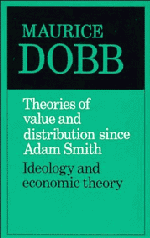4 - The Reaction against Ricardo
Published online by Cambridge University Press: 12 January 2010
Summary
In the years following Ricardo's death a considerable volume of criticism of his doctrine accumulated, and such was its impact, already before the end of the decade, as to make one wonder whether respect for his doctrine would have continued to be anything like so great as it was in the middle of the nineteenth century without the loyal championship (as well as popularisation) of his main doctrines by John Stuart Mill. By 1831, indeed, the Political Economy Club was holding a discussion on the question (tabled by Torrens) “whether any of the principles first advanced” in Mr Ricardo's work are “now acknowledged to be correct”; Torrens affirming in the discussion that “all the great principles of Ricardo's work have been successively abandoned, and that his theories of Value, Rent and Profits were now generally acknowledged to have been erroneous”.
Already in Ricardo's lifetime, of course, there had been rival poles of doctrine. Most definite and outspoken in its conservatism we have seen was the Earl of Lauderdale, no negligible economic thinker and one who swam boldly against the incoming tide of Smithianismus. Not only was he in policy protectionist, at least so far as the Corn Laws were concerned, but a leading pre-occupation with him was to denounce the “baneful passion for accumulation that has been falsely denominated virtue” and to demonstrate “the full extent of the evil that must arise from indulging” it.
- Type
- Chapter
- Information
- Theories of Value and Distribution since Adam SmithIdeology and Economic Theory, pp. 96 - 120Publisher: Cambridge University PressPrint publication year: 1973

